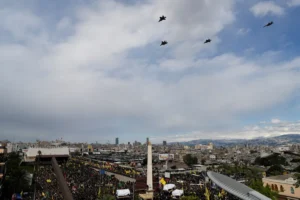Iran increases crackdown on women’s rights after Mahsa Amini’s death, say UN rxperts
Two years after the death of Mahsa Amini, whose tragic fate ignited mass protests across Iran, the country has reportedly escalated its repression of women’s rights, according to UN experts.

Two years after the death of Mahsa Amini, whose tragic fate ignited mass protests across Iran, the country has reportedly escalated its repression of women’s rights, according to UN experts. Amini, a 22-year-old Kurdish Iranian, died in September 2022 after being arrested for allegedly violating Iran’s strict dress code, which mandates the wearing of a headscarf.
Her death sparked widespread demonstrations, but according to a recent UN statement, the situation has only worsened.
UN-appointed experts from the Human Rights Council, tasked with investigating the crackdown on these protests, have accused Iran of “intensifying its efforts to suppress the fundamental rights of women and girls.” In a fresh statement released on Friday, they noted that while the protests may have quieted, “the unabated defiance of women and girls is a continuous reminder that they still live in a system that relegates them to ‘second class citizens.’”
A particular focus of the report was the government’s so-called “Noor Plan,” which aims to enforce hijab laws more rigorously. Since April, repressive measures have increased, according to the experts, who described a pattern of physical violence against women and girls deemed to be violating hijab rules. The experts further detailed the deployment of drones and other surveillance tools to monitor hijab compliance, extending even into private spaces such as vehicles.
Adding to the gravity of the situation, a “Hijab and Chastity” bill, currently nearing final approval, could introduce even harsher penalties for women who resist mandatory dress codes. If passed, it would impose heavy fines, long prison sentences, and travel bans on offenders.
The experts also expressed alarm over what they described as “an apparent new pattern of sentencing to death of women activists… following their convictions for national security offenses.” They warned that the death penalty has been increasingly used as a means to “terrorize and deter Iranians from protesting and expressing themselves freely.”
This escalation, two years after Mahsa Amini’s death, marks a grim chapter in Iran’s ongoing crackdown on women’s rights, raising concerns about the future of activism and human rights in the country.







